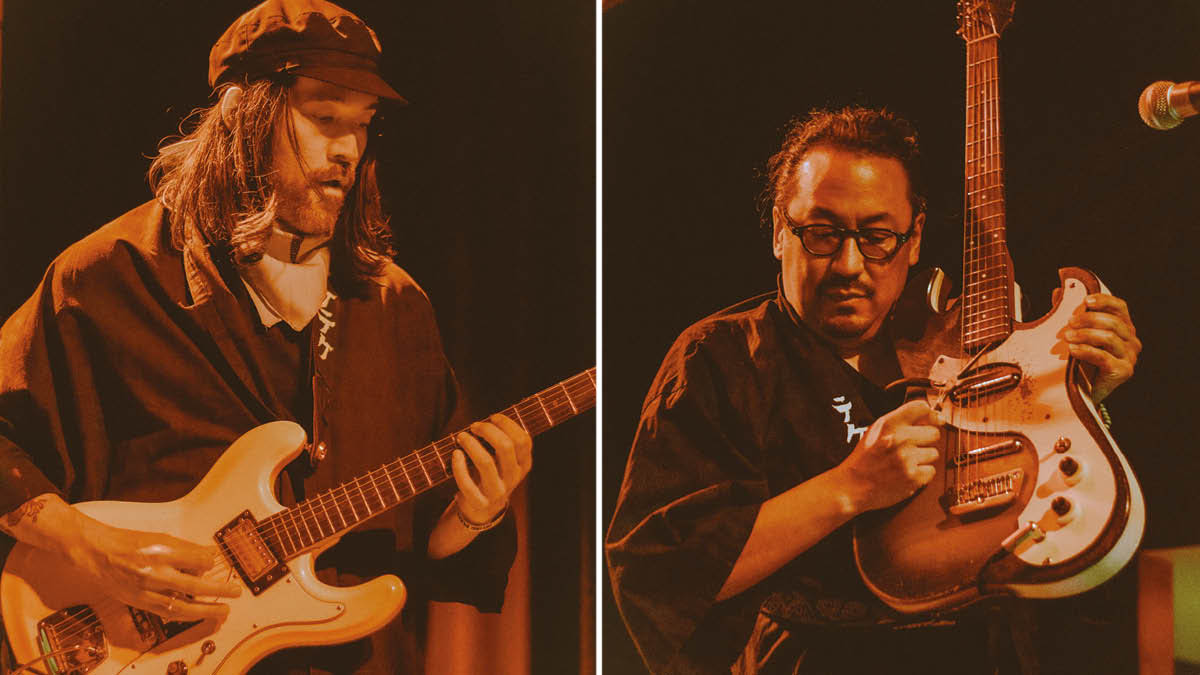
When Montreal’s Teke::Teke first formed to cover the music of Japanese surf guitar icon Takeshi Terauchi, bandleader Sei Nakauchi Pelletier aimed to capture the explosive, tube-carving essence of his hero’s playing, rather than recreate his gear haul.
Nevertheless, when Pelletier recently found an old Mosrite online – the late Terry’s brand of choice – he knew he had to grab it. Trouble is, his new toy hardly gets as much play as the worn-in Univox Hi-Flier he’s been hauling around since Teke::Teke’s early days.
“I always go back to the Hi-Flier. I feel like it’s just the sound of Teke::Teke,” Pelletier says, citing the vintage offset’s high-set whammy bar and grittier presence as reasons for making it his go-to. “It’s almost too slick, the Mosrite – too hi-fi, somehow. I feel like I have to be delicate.”
On Hagata, Teke::Teke’s second album of originals, the septet crash surf-informed phosphorescence through elements of doom-laden psych-rock and the honeyed bass bump of early ’70s Serge Gainsbourg. Throughout, Pelletier and co-guitarist Hidetaka Yoneyama ride a riptide of rotating wahs, ring mods and antique overdrives.
Live, Yoneyama is also prone to producing teal-textured waves of guitar feedback with the use of portable fans and needle nose pliers. While historically the more ambient player, raw power Hagata highlight Hoppe has Yoneyama going for broke with feverishly abstract, off-meter scale-crawling.
“It used to be more that Hidetaka would do more of the rhythm guitar, and I would do most of the leads,” Pelletier says of the dynamic, “but by the end of Hoppe I’m doing the down-strumming, punk-ish guitar [while] Hide is doing the crazy, weird stuff overtop of it.”
That role-swap is just part of why Pelletier considers Hagata a more “fluidy” album than the band’s 2021 debut, Shirushi. Take how instruments often subvert their origins: vocals are undulated through after-effects; trombones are pipelined through rusted-out Pro Co Rat distortion pedal.
And in an explicit nod to Terauchi’s playing, the boisterous, roiling Garakuta finds Pelletier playing close to his Hi-Flier’s bridge to yield a percussively twangy timbre more akin to traditional Japanese stringed instruments like the Shamisen or the Koto.
While Pelletier took on a conductor/composer role for Shirushi, the full band fleshed out and evolved Hagata’s arrangements in the studio – those in-flux conditions often meaning the septet were too caught up in the moment to marvel at what’s become their boldest psych-surf statement yet.
“We had a lot of adrenaline coming out of [us],” Yoneyama says. “Sometimes we didn’t remember what we did until the day after; as we were listening back, [it was like], ‘Oh, that’s so magical!’ A lot of magic happened in the studio.”
- Hagata is out now via Kill Rock Stars.







